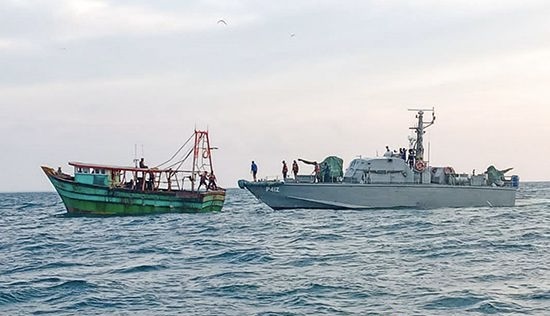Sri Lankan fishermen caught in the geopolitical nets of China and India
In June Beijing allocated over 5 million dollars in aid, equipment and assistance. India had previously invested billions of rupees in development projects. The accusation against Indian fishermen who use trawl nets: ‘If this practice continues, there will be no more fish left in our areas in the future’.
Colombo (AsiaNews) - Fishermen in northern Sri Lanka are increasingly at risk of getting caught up in regional geopolitics, following the emergence of China as a new player seeking to insert itself with increasing insistence in the confrontation between Colombo and Delhi. At the centre of the dispute between the two South Asian countries is the practice of illegal trawling by boats flying the Indian flag in Sri Lankan territorial waters.
Several workers from the northern islands such as Delft, Kayts, Eluvaithivu, Mandaithivu, Nainathivu and Punkudithivu have organised a protest demonstration in front of the offices of the Department of Fisheries for 27 February, because this method of fishing is depriving them of their means of subsistence.
Last June, Beijing donated 1.5 billion rupees (over 5 million dollars) in humanitarian aid, fishing equipment, prefabricated housing and dry food rations for fishermen in the northern and eastern provinces, the largest shipment since the war. Previously, in 2023, China had already strengthened its assistance to fishermen by donating 150 litres of kerosene per boat to 27,000 fishing vessels throughout Sri Lanka. In view of this growing competition, India has also invested billions of rupees in development projects, livelihood improvement and infrastructure in the Northern Province.
Despite foreign assistance, Northern fishermen remain sceptical of the Colombo government's commitment to resolving their long-standing grievances. Meanwhile, at least 67 huge mechanised Indian trawlers, seized last year by the Fisheries Authorities, are anchored at the island's piers, denying space to local fishermen's boats until they are auctioned off. Arul Rubatheesan (53), Malcolm Jeyarajah (50) and Raj Sinniah (45), leaders of the fishing community, explained to AsiaNews the many problems they face: ‘Our fishermen have specific types of nets with different sized holes for fishing, but our Indian colleagues sweep away everything. If this practice continues, there will be no fish left in our traditional fishing grounds in the future.
According to Annalingam Annarasa, secretary of the KaytsFishermen Cooperative Society, the fishermen are convinced that this government too could ‘not face’ problems that have been dragging on for too long. The executive should strictly apply the law and the recent amendments to the Fisheries and Aquatic Resources Act 1996, No. 2 of 1996. Is the Colombo leadership, asks the leader of the fishing movement, setting ‘us [northerners] against Indian fishermen for political and geopolitical gains?’
S. Anthony Vimalathas, president of the Mandaithivu Fishermen's Union, explains how in the area ’for several days we have seen Indian fishing boats 3.5 nautical miles from the coast. Last week, fishermen from Gurunagar, in Jaffna, discovered a huge abandoned Indian trawl net and found fish ranging from juveniles to larger species in the net’.
The total catch was estimated at 400,000 rupees, but it largely included small or newborn species, thus highlighting the ‘devastating impact of trawling on Sri Lanka's marine resources. We have informed the Navy, but the fishermen have not been arrested. Our fishermen's nets have also been damaged. We are exhausted from filing complaints, while the authorities remain silent on the matter’.
The fishermen of Palaly, 30 minutes from Jaffna, in the Northern Province, have witnessed ’the arrival of trawlers from Tamil Nadu, which resemble a kovil thiruvizha [Hindu temple festival]: hundreds of boats with bright lights show up after 8pm to ‘trawl’ for any fish species in their path, causing environmental damage and loss of income’.
If Indian fishing boats are prevented from entering our waters, they warn, ‘we will be able to earn a decent living’, concludes the note from the fishermen of North Palaly. Finally, in Mandathivu, many families refused the packs of Chinese rice distributed by the fishing unions because ‘the rice was sticky and unappetising’. Currently, about 100 kg of rice are stored for months in our warehouses.
‘We don't need to depend on humanitarian aid if the government can ensure that the country's laws are properly enforced in our seas,’ the fishermen conclude.







.png)










